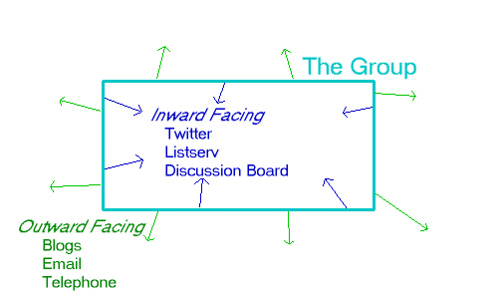Stephen Downes recently argued that we could classify communication as inward and outward facing, saying:
a technology like Twitter is, in my mind, 'inward facing', because it reinforces communication with the group - 'running with the herd,' as I commented on Noon's post, while I tend to favour 'outward facing' communications, those that look outside the group.
And he has this diagram to sum it up:
http://www.flickr.com/photos/stephen_downes/2379258809/
I'm not sure I agree with this analysis, as I think it comes down to your usage of the tools. Here is my reasoning:
- I don't think many of us are outward facing in terms of the blogs we read. For instance, my GReader doesn't have many subscriptions to intelligent design blogs, or pregnancy, or snowboarding blogs, because these aren't things I'm particularly interested in. The blogs I subscribe to tend to be educational technology ones. So in terms of what I read blogs are no more outward facing than Twitter.
- I could argue Twitter is outward facing since I tend to adopt a 'I'll follow you if you follow me' strategy. Thus potentially I am exposed to different types of people than I might be through the blogs I read. This would be even more the case if I were one of those people who followed 1000s of people in Twitter.
- I accept that writing a blog is more akin to broadcast while Twittering is more akin to conversation, but even that distinction is blurred if you consider linking and commenting in blogs (which make them more like conversation) and the posting of links in Twitter. One could argue that because it is less effort to Twitter then people are more likely to post links to a range of things, not just those related to the subject area. In this respect then, Twitter becomes more outward facing.
- The social interaction on Twitter adds a different element, which you don't always get on blogs. This means that, again, you may discuss topics or be pointed at resources which are outside of the group's normal discussion.
I'm not arguing one is better than the other, just that I don't feel the inward and outward facing distinction is appropriate to my use of the tools. Or maybe I've misunderstood what Stephen was saying - if so, just shout Stephen!

I've only just started to use Twitter, having been seriously very skeptical about it. I agree: it's how you use it. I use it for peer group communications to get a sense of community whilst working at a distance, whereas attending a local usability group the other day organisers were proposing using it to broadcast events to subscribers: totally outward facing.
Posted by: Chris Douce | 16/04/2008 at 03:07 PM
Yup. Examples:
https://twitter.com/MicroBytes is outward facing.
https://twitter.com/AJCann is ... kinda sideways - both inward and outward facing?
Posted by: AJ Cann | 16/04/2008 at 05:19 PM
Martin,
I have to agree that Stephen's breakdown of Twitter as an either/or technology precludes a lot of the possibilities of Twitter. Stephen is remarkable in the sheer range of EdTech blogs he follows, and provides an excellent representation of a wide range of ideas from the EdTech field, in many ways this is part of what makes him such an invaluable resource.
At the same time, the field itself is somewhat circumscribed by one's particular interests. And I have come in contact with a wide range of folks that I might otherwise not have through Twitter in the EdTech field. I had locked down my Tweets for awhile becuse I felt I wanted that space to be very informal and loose, but once I opened my account up and began requesting to follow and received requests from others, I feel my network has grown considerably. Particularly in communities that I wouldn't regularly be a part of, which in many ways seems counter-intuitive to the inwards facing logic it is placed within.
So while the choice to follow or not to follow always looms in Twitter, I don't see how different it is from choosing to follow a link from the OL Daily, subscribe to a blog, or explore some other reference that I think is valuable and/or trustworthy.
Twitter is in many ways the ultimate recommender tool in that it allows you to see who is following who, who is talking to who, etc. Joining in this conversation becomes that much easier, making it in many respects, as you suggest above, an outward facing technology depending on the way in which you use it.
Posted by: Jim | 16/04/2008 at 06:35 PM
I have to agree with your assessment. It entirely depends on how the user chooses to use the tool, and with whom they choose to use it. While some tools may be more _efficient_ for certain types of communication, or encourage a certain type of usage, it's still all up to the user.
For example, the telephone was listed as a technology that was "outward facing", something that reinforces communication "outside the group". What group? I primarily use the telephone these days to communicate with family - my kin group. That seems like it would fall under the "inward facing" definition.
My use of Twitter right now is "outward facing". Though I've added a few friends, most of the people I follow are strangers to me - outside of my kin group. Are they my peer group? Maybe, since I've chosen most based on an academic interest, but I'm still a student, and some of these folks are researchers, faculty members and people in the industry. I chose them to try and stretch beyond the people I immediately know, but within a specific area of interest. It's both inward and outward in that sense.
Posted by: Fazia Rizvi | 16/04/2008 at 07:04 PM